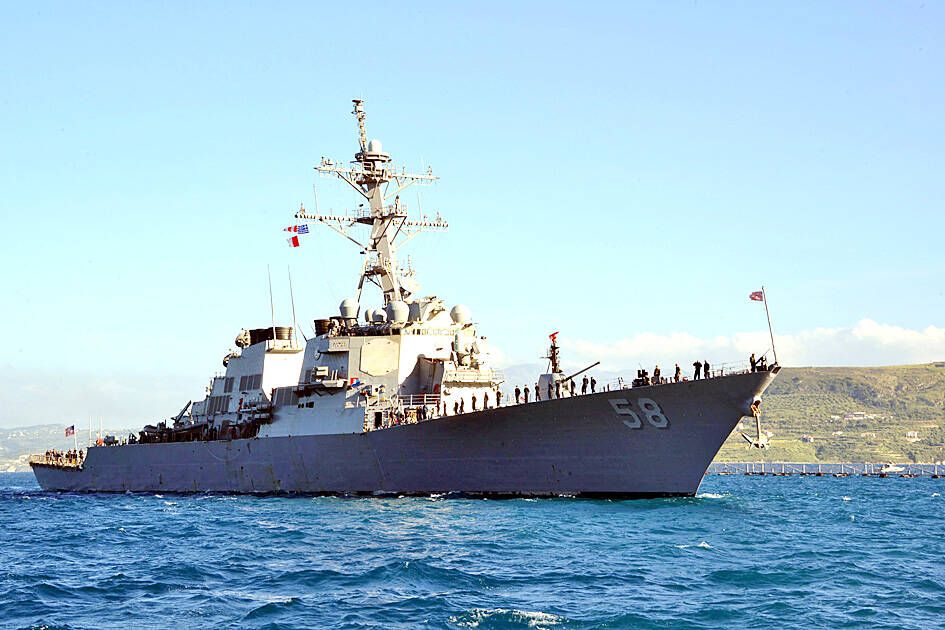The US military on Sunday said that its forces shot down a cruise missile fired at a US destroyer warship from Houthi controlled areas of Yemen.
The attack appears to be the first against a US destroyer amid a growing number of missile and drone strikes or attempted strikes by the Houthis on what they deem Israeli-linked shipping in the Red Sea.
“On January 14 at approximately 4:45pm [Sana’a time] an anti-ship cruise missile was fired from Iranian-backed Huthi militant areas of Yemen toward USS Laboon, which was operating in the Southern Red Sea,” US Central Command said.

Photo: AFP / US Navy / Mass Communication Specialist 2nd Class Jeffrey M. Richardson
“The missile was shot down in vicinity of the coast of Hodeida by US fighter aircraft. There were no injuries or damage reported,” it said.
The Houthis have said they are acting in solidarity with Gaza, where Hamas militants have been battling Israel for more than three months.
ALLEGED STRIKES
Earlier, the US denied Yemeni rebel reports that it carried out new attacks on targets in Yemen.
Houthi media said that the US and British strikes had hit rebel-held Hodeida, but a US defense official speaking on condition of anonymity said: “No US or coalition strike occurred today.”
US and British forces on Friday last week said that they hit scores of rebel targets across Yemen, heightening fears that Israel’s war with Hamas could engulf the region.
Late on Friday, the US military said it had conducted a “follow-on” strike against a Houthi radar site, following an initial barrage earlier against rebel military facilities.
About 12 percent of global trade normally passes through the Bab al-Mandeb Strait, the Red Sea entrance between southwest Yemen and Djibouti, but the rebel attacks have affected trade flows.
Washington last month announced a maritime security initiative, Operation Prosperity Guardian, to protect maritime traffic in the area, but the Houthis have kept up attacks despite several warnings.

The collapse of the Swiss Birch glacier serves as a chilling warning of the escalating dangers faced by communities worldwide living under the shadow of fragile ice, particularly in Asia, experts said. Footage of the collapse on Wednesday showed a huge cloud of ice and rubble hurtling down the mountainside into the hamlet of Blatten. Swiss Development Cooperation disaster risk reduction adviser Ali Neumann said that while the role of climate change in the case of Blatten “still needs to be investigated,” the wider impacts were clear on the cryosphere — the part of the world covered by frozen water. “Climate change and

Poland is set to hold a presidential runoff election today between two candidates offering starkly different visions for the country’s future. The winner would succeed Polish President Andrzej Duda, a conservative who is finishing his second and final term. The outcome would determine whether Poland embraces a nationalist populist trajectory or pivots more fully toward liberal, pro-European policies. An exit poll by Ipsos would be released when polls close today at 9pm local time, with a margin of error of plus or minus 2 percentage points. Final results are expected tomorrow. Whoever wins can be expected to either help or hinder the

DENIAL: Musk said that the ‘New York Times was lying their ass off,’ after it reported he used so much drugs that he developed bladder problems Elon Musk on Saturday denied a report that he used ketamine and other drugs extensively last year on the US presidential campaign trail. The New York Times on Friday reported that the billionaire adviser to US President Donald Trump used so much ketamine, a powerful anesthetic, that he developed bladder problems. The newspaper said the world’s richest person also took ecstasy and mushrooms, and traveled with a pill box last year, adding that it was not known whether Musk also took drugs while heading the so-called US Department of Government Efficiency (DOGE) after Trump took power in January. In a

It turns out that looming collision between our Milky Way and Andromeda galaxies might not happen after all. Astronomers on Monday said that the probability of the two spiral galaxies colliding is less than previously thought, with a 50-50 chance within the next 10 billion years. That is essentially a coin flip, but still better odds than previous estimates and farther out in time. “As it stands, proclamations of the impending demise of our galaxy seem greatly exaggerated,” the Finnish-led team wrote in a study appearing in Nature Astronomy. While good news for the Milky Way galaxy, the latest forecast might be moot